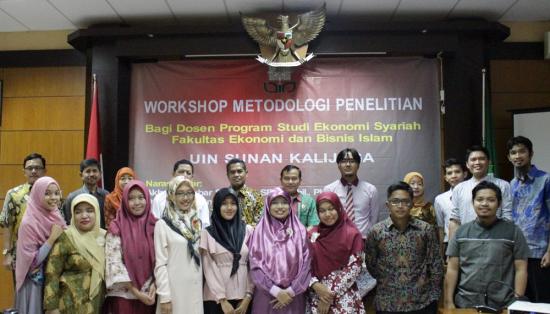Workshop on Research Methodology

Research in Islamic economics is in its nascent stage of development. Numerous educators and researchers have embraced Islamic economics as a novel subject within the broader field of economics. The study of Islamic economics encompasses various disciplines such as philosophy, history, ideology, political economy, and practical empirical aspects.
The lack of consensus among lecturers and researchers regarding the parameters of an "Islamic" economics study is a significant challenge. There is ongoing debate about whether every study should explicitly reference Islam, involve Muslims, or adhere to specific criteria. Consequently, many educators and researchers have gravitated towards focusing exclusively on research related to Islamic banking, Islamic stocks, zakat, waqf, and other Islamic economic instruments in an effort to categorize their work as part of Islamic economics.
This mindset requires a paradigm shift. Research in Islamic economics does not necessarily need to incorporate explicit Islamic attributes, as Islamic research is inherently transformative. This viewpoint was underscored by Akhmad Akbar Susamto during the Research Methodology Workshop on Thursday (29/03) at the Old Rectorate Building, 2nd Floor, UIN Sunan Kalijaga Yogyakarta.
The event was attended by the Dean of the Faculty of Islamic Economics and Business (FEBI) Dr. Syafiq Mahmadah Hanafi, M.Ag., Vice Dean I FEBI Dr. Casmini, Vice Dean III FEBI Dr. Shofiyullah Muzammil, M.Ag., Head of Islamic Economics Study Program Dr. Sunaryati, SE., M.Si., Head of Islamic Financial Management Study Program M. Yazid Affandi, M.Ag., and several lecturers from FEBI UIN Sunan Kalijaga Yogyakarta.
The speaker, who also serves as a lecturer at UGM, further elaborated, stating, "Transformational Islamic research denotes research that offers tangible solutions to societal challenges and contributes to the welfare of society at large, as well as the academic community in particular."
"We can establish this methodology through four key concepts: first, to envision the ideal proportion; second, to assess the current situation; then to compare the ideal with the actual; and lastly, and most significantly, to bridge the gap between the ideal and the actual. Islamic research can play a pivotal role in this," Akbar elaborated.
The event, held by the Islamic Economics Study Program, also featured a second speaker, Dr. Jaka Sriyana, SE., M.Si. During the event, Jaka Sriyana delved into the intricacies of mixed research methodology during the event. He expounded on the two approaches within this methodology: first, mixed data, which involves the utilization of both qualitative and quantitative data in research, and second, mixed analysis, which employs both quantitative and qualitative approaches as methods for analyzing research data. These two approaches can be effectively applied to the study of both conventional economics and Islamic economics.
